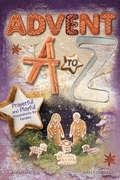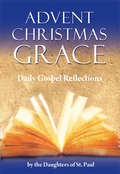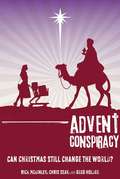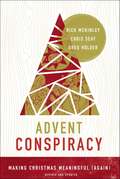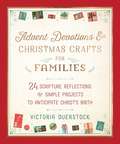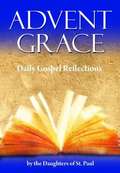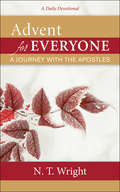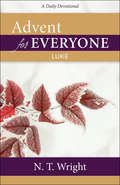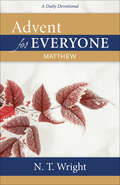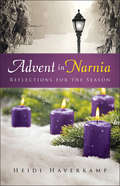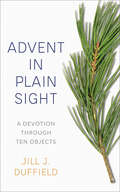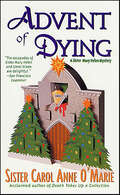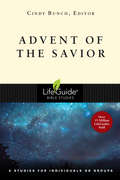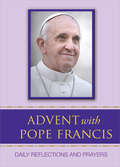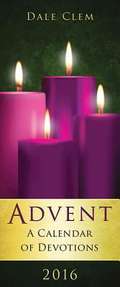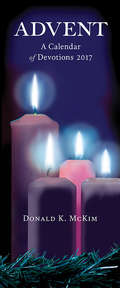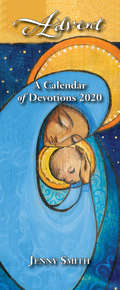- Table View
- List View
Advent A Calendar of Devotions 2019 (Pkg of 10)
by Teer HardyProviding daily devotions for Christians preparing to celebrate Christ's birth, this annual favorite is a great resource for you and other members of the congregation. The seemingly simple handout is filled with opportunities for spiritual renewal, you to focus on the coming Christ at the center of both the season and in your life. Beginning on the first Sunday of Advent and ending on Christmas Day, each day's devotional includes a suggested Scripture, a short devotion, and a closing prayer.
Advent A to Z: Prayerful and Playful Preparations for Families
by John Indermark Sharon HardingScripture and tradition fill the season of Advent with an abundance of characters, themes, and symbols. Each casts a slightly different perspective on the meaning of Jesus' birth and God's promised realm, the two chief components for which this season bids our preparation. Beginning December 1 and running through December 26, each day will explore an Advent-related word that begins with a successive letter in the alphabet. This is followed by suggestions for simple, easy-to-prepare, and complete activities (discussion starters, games, crafts, meditations, journaling, outreach project, devotions). The activities are based on that day's word and are ideal for parents teaching their children about Advent.
Advent Another Look (Bible Daily Notes: Practical Application from God's Word)
by Jeff LucasChristmas is rushing toward us, and you may already be looking forward to presents, food, and time with family and friends. But for some, Christmas brings mixed emotions. Memories of happier days mean aching hearts, missing loved ones who are no longer with us. And while we&’re thrilled to celebrate the birth of our Savior, oftentimes in all the rush, festivities, and emotions, Christ is ignored or given only token recognition. In Advent: Another Look, we&’ll take a careful journey to look at the incarnation of Christ. We will see who was there, what the prophets of old had to say, and what the incarnation means. And maybe we will then be able, once again, to stand amazed at the wonder of God&’s most incredible gift of His Son, and to experience our hearts warmed afresh during this chilly season. Bible Daily notes are written by Jeff Lucas to help you apply the lessons of God&’s Word daily. Each day and with each devotion, Jeff uses his signature wit and wisdom to reveal insights and practical application you can use in your own life. Each Bible devotion takes only a few minutes to read, but the lessons learned can last a lifetime.
Advent Christmas Grace
by The Daughters of St. PaulJoin the Daughters of St. Paul as they share the fruit of their lectio divina (a prayerful reading of Sacred Scripture) in this new expanded edition of Advent Christmas Grace. This handy volume features insightful reflections on the daily Gospel readings for the Advent and Christmas seasons. Perfect for all those who value daily devotional reading, the meditations are brief and powerful. They will give enlightenment to those who are proficient in this practice and encouragement to anyone just beginning.
Advent Conspiracy: Can Christmas Still Change the World?
by Rick Mckinley Chris Seay"The story of Christ’s birth is a story of promise, hope, and a revolutionary love. So, what happened? What was once a time to celebrate the birth of a savior has somehow turned into a season of stress, traffic jams, and shopping lists. And when it’s all over, many of us are left with presents to return, looming debt that will take months to pay off, and this empty feeling of missed purpose. Is this really why we celebrate Christmas? What if Christmas became a world-changing event once again? [AC] Advent Conspiracy is an international movement restoring the scandal of Christmas by substituting compassion for consumption. For three years, Advent Conspiracy has been giving people hope that Christmas doesn’t have to be about credit cards, to-do lists and traffic jams. This four-session DVD study will introduce you to this revolution in compassion as you learn to: Worship Fully. It starts and ends with Jesus. It’s a season where love wins, peace reigns, and a king is celebrate. It’s the party of the year. Spend Less. Americans spend an average of $450 billion a year every Christmas. What if we all committed to buying just one less gift this year? Give More. God’s gift to us was a relationship built on love. Time is one of the more precious gifts we can give at Christmas, time to make love visible through relational giving. This Christmas, give presence to those you love. Love All. When Jesus loved, he loved in ways never imagined. By spending less at Christmas we have the opportunity to join him in giving resources to those who need them most. Nobody wants a Christmas worth forgetting. Welcome to the Advent Conspiracy."
Advent Conspiracy: Making Christmas Meaningful (Again)
by Chris Seay Rick McKinley Greg HolderAn updated and revised version of a book that has impacted thousands of churches: Are you tired of how consumerism has stolen the soul of Christmas? This year, take a stand! Join the groundswell of Christ-followers who are choosing to make Christmas what it should be—a joyous celebration of Jesus’ birth that enriches our hearts and the world around us, not a retail circus that depletes our pocketbooks and defeats our spirits. Advent Conspiracy shows you how to substitute consumption with compassion by practicing four simple but powerful, countercultural concepts: Worship Fully—because Christmas begins and ends with Jesus. Spend Less—and free your resources for things that truly matter. Give More—of your presence: your hands, your words, your time, your heart. Love All—the poor, the forgotten, the marginalized, and the sick in ways that make a difference. Find out how to have a Christmas worth remembering, not dreading. Christmas can still change the world when you, like Jesus, give what matters most—your presence.This updated and revised version, with some all-new content, will share stories of the impact this movement has made around the globe as well as giving individuals and churches even better, more practical help in planning the kind of Christmas that truly can change the world.New introduction, new chapter and changes throughout.
Advent Devotions & Christmas Crafts for Families: 24 Scripture Reflections & Simple Projects to Anticipate Christ's Birth
by Victoria DuerstockKeep the Focus on Jesus this Christmas with 24 Family Devotions for Advent! The flurry of shopping, gift giving, recitals, and parties adds a certain amount of tension to a season meant to be infused instead with awe and wonder. Ask most families what the focus of Christmas really is and they will readily answer that it is the birth of Christ, yet so many of us find ourselves overwhelmed with activities, travel plans, hosting, and more. Trying to prepare our hearts and our families to celebrate His birth becomes secondary while we try to survive the busyness! Victoria Duerstock wants to support families in their desire to make Christ the focus of all their celebrations this Christmas. Each day of this family devotional includes not only a Scripture and short short reflection for the twenty-four days leading up to Christmas, but also inviting full-color images and simple Christmas crafts that can be done as you focus on the rich meaning of this season. Find easy-to-follow instructions for: Stained Glass OrnamentsCinnamon Oatmeal SoapMason Jar LuminariesHomemade MarshmallowsScrap Ribbon Tree OrnamentsAnd many more! Each devotional through the four weeks of Advent is focused on the themes of Hope, Preparation, Joy, and Love and is meant to be read with the entire family, or by the older child who needs something just for them in this special season.Advent Devotions & Christmas Crafts for Families will be your new favorite holiday tradition. It makes a wonderful early Christmas gift for kids, parents, or grandparents!
Advent Grace
by Daughters of St. PaulIn this daily Advent companion, members of the Daughters of St. Paul share their reflections and lead readers in lectio divina on the Scripture readings for the season. Includes reflections for the Octave of Christmas.
Advent International and Walmart Brazil's Deal
by Victoria Ivashina Ruth Costas Pedro LevindoAdvent International, one of the world's leading private equity firms, must decide whether to acquire Walmart's subsidiary in Brazil or not. Although Walmart Brazil is losing cash at a rapid pace, Advent thinks it has a solid plan to recover the company's finances. However, there are several execution risks associated with the deal and local analysts are skeptical about the possibility of a quick turnaround.
Advent International: Kroton Investment
by Victoria Ivashina Priscilla Zogbi Ruth KostasCase - Finance
Advent for Everyone: A Journey Through Matthew
by N. T. WrightAdvent for Everyone: Mark, Year B provides readers with an inspirational guide through the Advent season, from the first Sunday in Advent through the Saturday after the Fourth Sunday in Advent. Popular biblical scholar and author N. T. Wright provides his own Scripture translation, brief reflection, and a prayer for each day of the season, helping readers understand Advent in the wider context of God's love. Wright's engaging and accessible writing and imagery help us see Advent both in relation to the gospel message and in our own lives today. Each Sunday's text uses the Mark passage from the Revised Common Lectionary, with the rest of the week drawn from other passages in the Gospel and the lectionary. This book is suitable for both individual and group study and reflection.
Advent for Everyone: Luke
by N. T. WrightAdvent for Everyone: Luke provides readers with an inspirational guide through the Advent season, from the first Sunday in Advent through the Saturday after the Fourth Sunday in Advent. Popular biblical scholar and author N. T. Wright provides his own Scripture translation and brief reflection, exploring the Gospel themes of faith, repentance, justice, and celebration. Wright's engaging reflections take you on a journey of spiritual enlightenment, guiding you toward the wonder and joy of Christmas. This book is suitable for both individual and group study and reflection.
Advent for everyone
by Dr N. T. WrightAdvent for Everyone: Matthew provides readers with an inspirational guide through the Advent season, from the First Sunday of Advent through the Saturday after the Fourth Sunday of Advent. Popular biblical scholar and author N. T. Wright provides his own Scripture translation and brief reflection to guide readers through the season toward the wonder and joy of Christmas. This book is suitable for both individual and group study and reflection.
Advent in Narnia: Reflections for the Season
by Heidi Haverkamp"Walking into Advent can be like walking through the wardrobe. " With its enchanting themes of snow and cold, light and darkness, meals and gifts, temptation and sin, forgiveness and hope--and even an appearance by Father Christmas--C. S. Lewis's The Lion, the Witch, and the Wardrobe fits naturally into the Advent season. As the reader seeks a storied king and anticipates the glorious coming of Christmas, these twenty-eight devotions alternate between Scripture and passages from the novel to prompt meditation on Advent themes. Each devotion also includes questions for reflection. The book also provides several resources for churches, including four sessions for small group discussion and ideas for creating a "Narnia Night" for families. Readers will ultimately come to know God better while journeying through Narnia.
Advent in Plain Sight: A Devotion through Ten Objects
by Jill J. DuffieldIn this daily devotional for Advent, Christmas, and Epiphany, Jill J. Duffield draws readers' attention to ten ordinary objects that appear in the biblical narratives of messianic prophesy and incarnation--objects we encounter in our own lives. Through objects such as gates, trees, cloth, light, and water, readers will find new meaning in the biblical account of Jesus' coming. By connecting everyday objects with biblical texts, Advent in Plain Sight prompts readers to see the near kingdom of heaven on earth and ponder what that divine proximity enables and asks them to do and be. Each daily devotional features a Scripture reading, prayer, and reflection, reminding Christians that God still dwells among us, even in the most ordinary places.
Advent of Dying (Sister Mary Helen Mysteries #2)
by Carol Anne O'MarieIn her 70s, Mary Helen is supposedly retired at Mount St. Mary College. When her timid secretary Suzanne Barnes is murdered, however, the grieving nun determines to see justice done. Her friends in the police have no leads; very little is known about the victim, who had appeared out of nowhere, seemingly, to work at the school. Taking her equally daring religious companions on visits to people in Suzanne's apartment building, Mary Helen questions the residents but gets no solid clues.
Advent of Dying (Sister Mary Helen Mysteries)
by Carol Anne O'MarieReaders have come to delight in the murder-solving exploits of septuagenarian Sister Mary Helen and her cohort Sister Eileen, two nuns with a nose for nabbing killers. Publishers Weekly calls the Sister Mary Helen Mysteries "refreshingly different" and a "heady mix of humor and suspense." Once you meet this spry, clever sleuth, you'll want to make a habit of reading her adventures again and again.Timid little Suzanne Barnes was the perfect ecclesiastical secretary: efficient, discreet, self-effacing. So it came as a shock when Suzanne invited Sisters Mary Helen, Eileen and Anne to Ghiradelli Square's Sea Wench Bar to hear her belt out the blues. Sister Mary Helen wondered what secrets lay behind those watery blue eyes. The Sea Wench Suzanne was a revelation: sassy, sexy, dressed to kill. It was her first-and last-performance, punctuated by a silver letter opener in the heart. Who killed the canary? Sister Mary Helen and her faithful band must unearth Suzanne's secrets to solve the murder before all hell breaks loose-again...
Advent with Pope Francis
by Marianne Lorraine Trouvé FSPLet the inspiring words of Pope Francis guide your Advent journey of preparation so that you can fully celebrate the birth of Christ. This daily devotional includes Scripture citations for each day of the season, a selection of the Holy Father's writings, reflection questions, and a prayer. It will be the perfect volume to remind you to slow down and breathe in God's spirit, no matter how busy you find yourself!
Advent: A Calendar of Devotions 2013
by Deborah WestbrookThe season of Advent provides an opportunity for spiritual renewal for followers of Christ. But often what happens is that we get so caught up in the hurry and rush, the hustle and bustle, the frantic pace of the season that we emerge more spiritually exhausted than refreshed, more disillusioned than inspired to face the coming of a new year. We may have tried so hard to enjoy the holiday season, to recapture a sense of wonder and mystery, only to end up asking, "Is that all there is?" The purpose of Advent, A Calendar of Devotions 2013 is to help you focus on the things that truly matter during this busy season, so that you can experience spiritual renewal. Advent, A Calendar of Devotions 2013 is a booklet of daily devotions for the season of Advent (the four weeks before Christmas) that helps you step back from the bustle and stress of the season and prepare your heart and mind to rejoice in God's loving gift, Jesus Christ. Each daily devotion includes a recommended Scripture reading, a Bible verse, an inspiring message, and an uplifting prayer.
Advent: A Calendar of Devotions 2014 (Package of #10)
by James W. MooreAdvent: A Calendar of Devotions 2014 is a booklet of daily devotions for Advent that helps people step back from the bustle and stress of the season and prepare heart and mind to rejoice in God's loving gift, Jesus Christ. Each daily devotion includes a recommended Scripture reading, a Bible verse, an inspiring message, and an uplifting prayers. The season of Advent provides an opportunity for spiritual renewal for followers of Christ. But often what happens is that we get so caught up in the hurry and rush, the hustle and bustle, the frantic pace of the season that we emerge more spiritually exhausted than refreshed. The purpose of Advent: A Calendar of Devotions 2014 is to help the reader focus on the things that truly matter and experience spiritual renewal.
Advent: A Calendar of Devotions 2015 (Package of #10)
by Nell W. MohneyAdvent: A Calendar of Devotions 2015 is a booklet of daily devotions for Advent that helps people step back from the bustle and stress of the season and prepare heart and mind to rejoice in God's loving gift, Jesus Christ. Each daily devotion includes a recommended Scripture reading, a Bible verse, an inspiring message, and an uplifting prayer. When ordering your for a congregation, secure additional copies for nursing home residents, those in prisons, and other groups in need of encouragement but are unable to attend services. Designed to in a #10 envelope, enables churches to include the booklet in your Advent mailings.klet in your Advent mailings.
Advent: A Calendar of Devotions 2016 (Pkg of #10)
by ClemAn annual favorite, this booklet of daily devotions is designed for every family or individual in the congregation to have a copy.Advent: A Calendar of Devotions 2016 contains brief readings for each day in Advent, including a suggested Scripture, a short devotion, and a closing prayer. It offers an opportunity for daily exposure to God's challenge, love, and goodness which is yearning to be born in you. Sold in packs of 10, booklets are designed to fit in a #10 envelope, enabling churches to include the booklets in their Advent mailings, especially for those unable to attend services. An ideal outreach tool! This booklet fits in a standard business envelope, making it easy to mail to visitors or share as a part of your homebound or prison ministry.
Advent: A Calendar of Devotions 2017 (Pkg of #10)
by Donald K. MckimAn annual favorite, this booklet of daily devotions is designed for every family or individual in the congregation to have a copy. Advent: A Calendar of Devotions 2017 contains brief readings for each day in Advent, including a passage of Scripture, a short devotion, and a closing prayer. In honor of the 500th anniversary of the Protestant Reformation, the selections for 2017 reflect the writings of the Protestant reformers. Sold in packages of 10, the booklets are designed to fit in a #10 envelope, enabling churches to include them in their Advent mailings, especially to parishioners unable to attend services, and making it easy to mail to visitors or share as a part of homebound or prison ministry.
Advent: A Calendar of Devotions 2020 (Pkg of 10)
by Jenny SmithProviding daily devotions for Christians as they prepare to celebrate Christ's birth, this annual favorite is a wonderful resource for churches to give to each family to emphasize the importance of the Advent of our Lord. Each day’s reading, from December 1 to Christmas Day, is based on the Revised Common Lectionary and includes the Scripture, a short devotion, and a closing prayer. Larger font for ease of reading. Sold in packs of 10, booklets are designed to fit in a #10 envelope, enabling churches to include them in Advent mailings, and making it easy to mail to visitors or share as a part of home-bound or prison ministry.

